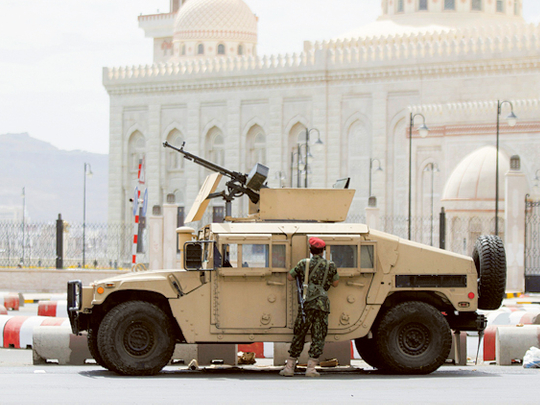
Sana’a: Yemeni security forces were on high alert Saturday for more Al Qaida reprisals over an offensive against them, after militants killed five presidential guards and ambushed the defence minister’s convoy.
The interior ministry said security forces in Sana’a had been reinforced, particularly around government installations and embassies.
It added that new checkpoints had been set up around the city to “block all terrorist acts” and that security forces were working “around the clock... to preserve security in the capital.”
There were also fears that reprisals might be carried out in the central province of Baida, one of three where the army has been pursuing a campaign against jihadists since April 29.
On Friday, suspected Al Qaida militants attacked the presidential palace in Sana’a, killing five guards and triggering a fierce gunfight as they hit back at the offensive aimed at crushing them.
President Abd Rabbo Mansour Hadi was not at the palace when gunmen attacked a checkpoint manned by guards outside the compound, a security source said.
Hadi, whose government has stepped up a war on Al Qaida in the Arabian Peninsula uses the palace only for meetings.
Sana’a has been on alert for days, and tensions rose after the army said troops had entered Azzan, a jihadist bastion in southern Shabwa province, prompting the United States to close its Sana’a embassy on Thursday.
That night security forces killed Al Qaida commander Shayef Mohammad Said Al Shabwani, one of the network’s most wanted leaders suspected of masterminding the abduction of Western diplomats, in a gunfight near the presidential palace.
On Friday, Defence Minister Mohammad Nasser Ahmad and two senior security officers escaped unharmed when gunmen ambushed their convoy as they returned from a tour of the south .
Ahmad has vowed to crush Al Qaida fighters in Yemen and on Friday told troops in Shabwa and Abyan that the offensive will continue until “the last criminal and evil” militant is killed.
The army launched its offensive on April 29 against AQAP strongholds in the contiguous provinces of Shabwa, Abyan and Baida, and claims it has inflicted heavy losses on the jihadists.
Officials said Saturday morning that the situation was relatively calm in Shabwa and Abyan, but state news agency Saba reported without giving details that “seven terrorists” had been killed in the two provinces.
Meanwhile, a tribal source said that, as government forces close in on their strongholds in Shabwa and Abyan, Al Qaida fighters had taken refuge in Al Kur, a mountainous area linking them and Baida.
On Friday night, Baida Governor Ahmad Al Shaddadi issued a statement in which he did not rule out that those elements, as well as “sleeper cells in Baida might commit acts of vengeance.”
He urged residents to cooperate with security forces and “denounce all suspect movements by... those who had fled fighting in Abyan and Shabwa.”
AQAP leader Nasser Al Wuhayshi vowed, in a rare video appearance posted online in April, to attack Western “crusaders” wherever they are.
Al Qaida uses the term crusaders to refer to Western powers, especially those which have intervened militarily in Muslim countries, such as Britain, France and the United States.












